Summer Program in Prague Offers Strategic Communication Students an Opportunity to Work with Nestlé, McCann Erickson and Charles University Students
By Angela Hamilton
Master’s Student
Columbia, Mo. (Oct. 8, 2009) — Eight Missouri School of Journalism students worked alongside nine students from Charles University in Prague, Czech Republic, to develop an integrated strategic communication campaign for the global giant nutrition and health company Nestlé. The group’s project focused on introducing a popular powdered cocoa mix, Granko, to an older demographic.
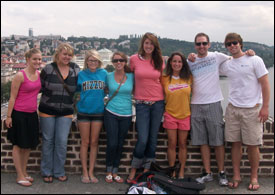
The summer trip to Prague, a part of the School’s extensive study abroad program, is a four-week, six-credit seminar course. Strategic communication students gain real-life work experience working with an internationally known brand and company, live and work in a different market, and enjoy the country’s cultural and social opportunities. They visit Czech media outlets and attend classes on advertising as well as local culture and history. The students also have the unique opportunity to work alongside Czech journalism students, receiving the mutual benefits of cross-cultural cooperation. Like all of the School’s study abroad programs, the Prague course includes a focus on culture: The students completed two-and-a-half weeks of intensive classes in Prussian/Czech history and culture.
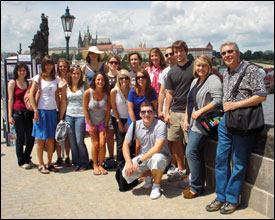
The program was conceived by Sandy Kornberg, BJ ’64, whose 30-year career in advertising took him to 22 countries, among them Japan, Hong Kong, Philippines, China, Korea, and France, Germany, Belgium and as well as the Czech Republic.
Since the program’s launch in 2005, the 28 participating students’ projects have included one for the tourism and cultural affairs department of the Czech government; a film distribution company called Blue Sky Films, which handled the Czech release of the films “Penelope” and “Traffic;” and global advertising agency McCann Erickson. The program is one of 20 journalism study abroad programs in 17 countries, but it is the only one specific to a particular major, in this case, strategic communication.
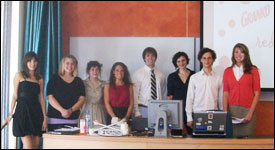
“The students from both countries have consistently come together each year with no significant prior knowledge of each other’s cultural backgrounds, course work or interests,” Kornberg said. “In every instance, each group from both countries developed a very quick and impressive degree of synergy and chemistry, to allow them to work in integrated teams and to develop recommendations, the quality of which has greatly impressed everyone.”
This year’s assignment challenged students to rebrand and introduce Granko to an older demographic. The Nestlé product is popular with a younger people, and advertising efforts are currently targeted to this audience.
The class split up into two teams, and each included Charles University and Missouri journalism students. Product revision and marketing ideas ranged from making a dark chocolate version and stressing the antioxidant benefits to packaging ideas, such as creating a family pack as well as combining the children’s version and the adult version in one larger package so people would be encouraged to try the new product. New slogans were considered, such as “You’re growing up and so is your Granko.”
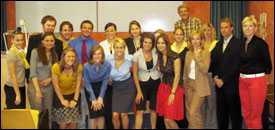
For the most part, meetings were conducted in English. Occasionally the Czech students would speak in their own language trying to come up with the best way to phrase something so their American colleagues would understand them.
The cultural barrier presented itself in other interesting ways. The Czech students, having grown up with Granko, brought in other powdered drink mixes for the Americans to sample alongside Granko so they would understand the differences between the competing products and their own. The American students, who had a difficult time telling the different products apart at first, suggested that they might create a liquid Granko to be sold in convenience stores alongside soda and juice. The Czech students, however, found this idea ludicrous, and explained to their colleagues that a liquid chocolate drink would never sell in their country.
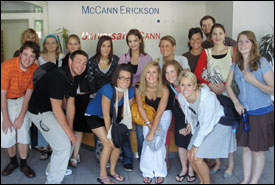
How well the students worked together despite the language and cultural barriers they faced impressed senior Kelsey Alexander.
“All of the students were very eager to learn. The Czech students helped us a lot with media costs, and we helped them with non-traditional advertising. Where we had strengths, they had weaknesses and vice versa, so we could really help each other,” Alexander said.
Another Missouri student, senior Nick Sauer, admitted to being intimidated at first by working for a company like Nestlé, with its far-reaching impact and visibility.
“I grew up with their products and to get the opportunity to work alongside the company officials was really cool. Going in, I knew they were a great company, but from the first day of working with them, I knew they meant business. Nestlé wants things done effectively and efficiently, and they made that clear to us. This pressure put on us to do well gave me a solid feeling of how the real world works,” Sauer said.
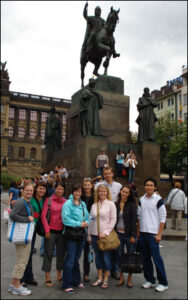
Across the board, the students felt that the Prague experience would help them immeasurably in their careers.
“Coming out of it, we knew exactly what our field would be. This is exactly how an ad agency works. It’s impressive to have on a resume, to have worked at such a young age for such big companies,” Alexander said, referring to both Nestlé and McCann Erickson.
Sauer agrees. “I would definitely recommend this program to someone. I think it’s the perfect amount of time, not too long and not too short. You also get both classroom knowledge and real world experience. And by working with a company like Nestlé, that’s definitely an eye-opener on a resume. Hopefully this experience will help land me a job in the near future.”
Students also complimented Kornberg’s leadership. “Sandy was amazing,” Sauer said. “He was there to help us anytime with anything, either be it with work or just getting around Prague. He possesses so much knowledge about advertising, and he shared that knowledge with us.”
The Prague program is exclusively offered for strategic communication students who have completed the principles of strategic communication course, have at least a 3.0 GPA and are in good academic standing.
Updated: May 6, 2020